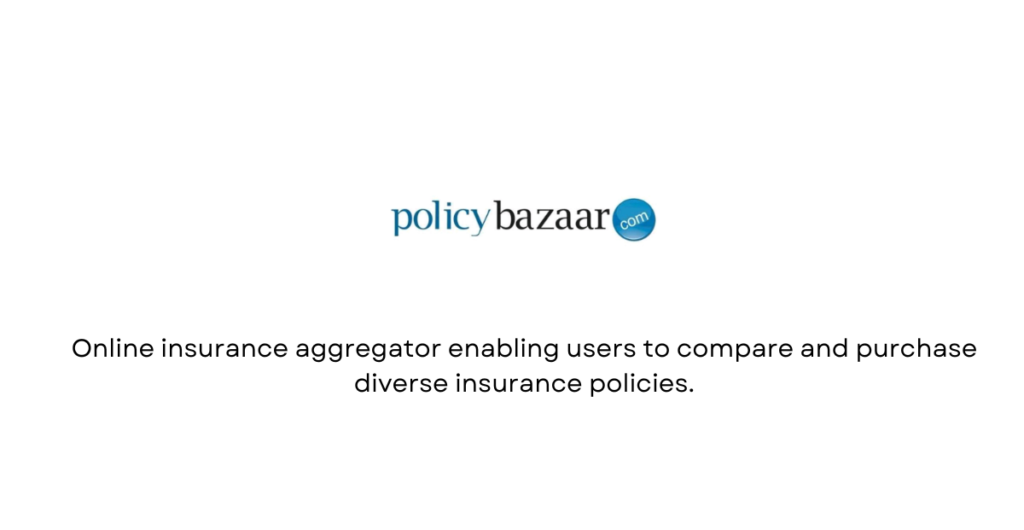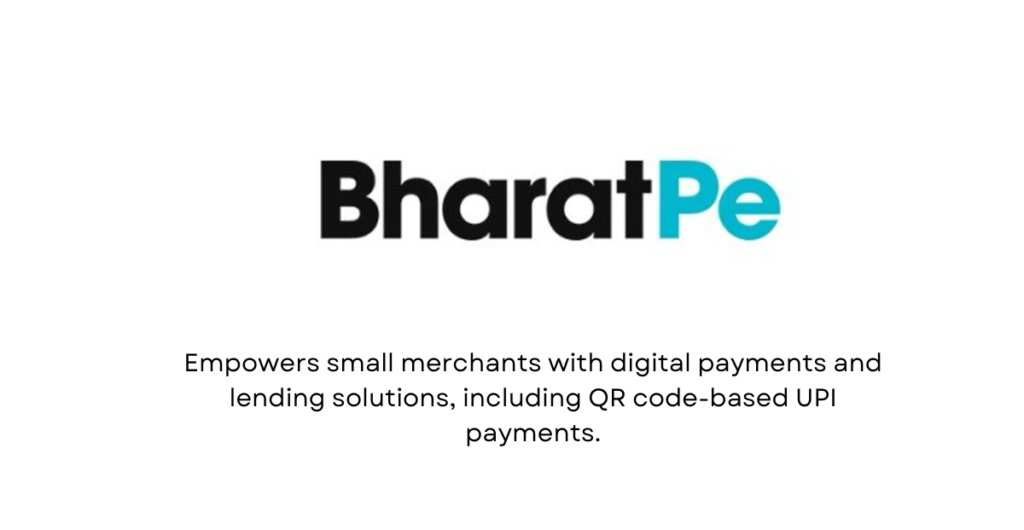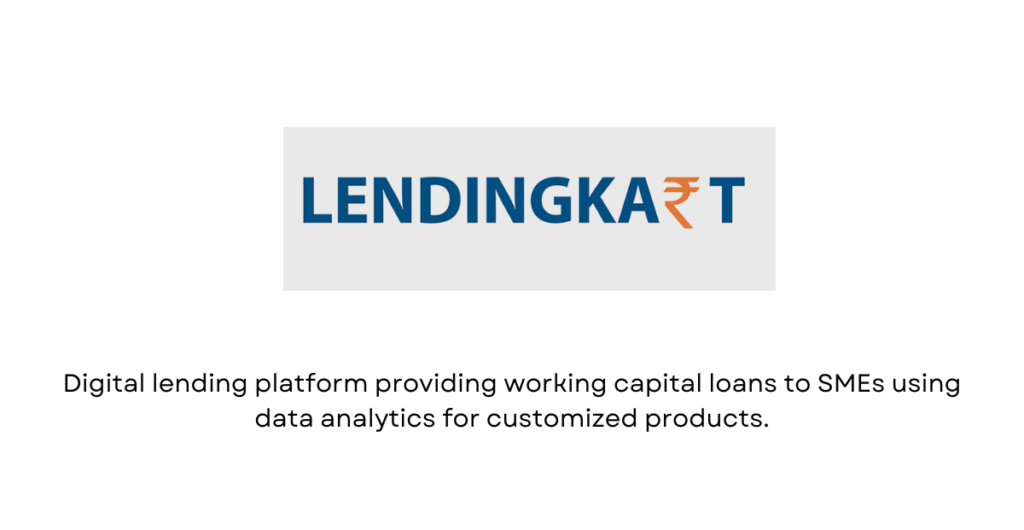The fintech sector in India has seen remarkable growth, driven by technological advancements, favorable regulatory policies, and a burgeoning digital user base. Here are the top 10 fintech startups in India that are at the forefront of this revolution:
1. Paytm

| Category | Details |
|---|---|
| Founders | Vijay Shekhar Sharma |
| Year Founded | 2010 |
| Headquarters | Noida, Uttar Pradesh |
| Overview | One of India’s largest digital wallets and payment platforms, offering services in banking, insurance, and e-commerce. |
Overview:
Founded in 2010 by Vijay Shekhar Sharma, Paytm started as a mobile wallet and has expanded into various financial services including banking, insurance, and e-commerce. It is one of India’s largest digital payment platforms.
2. Razorpay

| Category | Details |
|---|---|
| Founders | Harshil Mathur, Shashank Kumar |
| Year Founded | 2014 |
| Headquarters | Bangalore, Karnataka |
| Overview | Provides comprehensive payment gateway solutions for businesses, enabling seamless acceptance, processing, and disbursal of payments. |
Overview:
Established in 2014 by Harshil Mathur and Shashank Kumar, Razorpay offers a comprehensive payment gateway solution for businesses. It enables businesses to accept, process, and disburse payments seamlessly.
3. PhonePe

| Category | Details |
|---|---|
| Founders | Sameer Nigam, Rahul Chari, Burzin Engineer |
| Year Founded | 2015 |
| Headquarters | Bangalore, Karnataka |
| Overview | Leading UPI-based payment app facilitating a wide range of financial transactions, including bill payments, investments, and insurance. |
Overview:
Founded in 2015 by Sameer Nigam, Rahul Chari, and Burzin Engineer, PhonePe is a leading UPI-based payment app. It facilitates a wide range of financial transactions including bill payments, investments, and insurance.
4. PolicyBazaar

| Category | Details |
|---|---|
| Founders | Yashish Dahiya, Alok Bansal, Avaneesh Nirjar |
| Year Founded | 2008 |
| Headquarters | Gurgaon, Haryana |
| Overview | Online insura |
Overview:
Launched in 2008 by Yashish Dahiya, Alok Bansal, and Avaneesh Nirjar, PolicyBazaar is an online insurance aggregator. It allows users to compare and purchase various insurance policies such as health, life, and motor insurance.
5. Cred

| Category | Details |
|---|---|
| Founders | Kunal Shah |
| Year Founded | 2018 |
| Headquarters | Bangalore, Karnataka |
| Overview | Members-only platform rewarding users for timely credit card bill payments, offering exclusive offers and premium products. |
Overview:
Founded in 2018 by Kunal Shah, Cred is a members-only platform that rewards users for timely credit card bill payments. It offers exclusive offers and access to premium products and services.
6. Groww

Groww
| Category | Details |
|---|---|
| Founders | Lalit Keshre, Harsh Jain, Neeraj Singh, Ishan Bansal |
| Year Founded | 2016 |
| Headquarters | Bangalore, Karnataka |
| Overview | Investment platform allowing users to invest in mutual funds, stocks, ETFs, and gold with a user-friendly interface. |
Overview:
Established in 2016 by Lalit Keshre, Harsh Jain, Neeraj Singh, and Ishan Bansal, Groww is an investment platform. It allows users to invest in mutual funds, stocks, ETFs, and gold through a user-friendly interface.
7. BharatPe

| Category | Details |
|---|---|
| Founders | Ashneer Grover, Shashvat Nakrani |
| Year Founded | 2018 |
| Headquarters | New Delhi, Delhi |
| Overview | Focuses on empowering small merchants and Kirana stores with digital payments and lending solutions, providing QR code-based UPI payments and merchant loans. |
Overview:
Founded in 2018 by Ashneer Grover and Shashvat Nakrani, BharatPe focuses on empowering small merchants and Kirana stores with digital payments and lending solutions. It provides QR code-based UPI payments and merchant loans.
8. Zerodha

| Category | Details |
|---|---|
| Founders | Nithin Kamath, Nikhil Kamath |
| Year Founded | 2010 |
| Headquarters | Bangalore, Karnataka |
| Overview | India’s largest stock brokerage firm offering a discount brokerage model and innovative trading platform. |
Overview:
Started in 2010 by Nithin Kamath and Nikhil Kamath, Zerodha is India’s largest stock brokerage firm. It offers a discount brokerage model and an innovative trading platform, making stock trading more accessible.
9. Lendingkart

| Category | Details |
|---|---|
| Founders | Harshvardhan Lunia, Mukul Sachan |
| Year Founded | 2014 |
| Headquarters | Ahmedabad, Gujarat |
| Overview | Digital lending platform providing working capital loans to SMEs using data analytics for customized loan products. |
Overview:
Established in 2014 by Harshvardhan Lunia and Mukul Sachan, Lendingkart is a digital lending platform providing working capital loans to SMEs. It leverages data analytics to offer customized loan products.
10. ETMONEY

| Category | Details |
|---|---|
| Founders | Mukesh P Kalra |
| Year Founded | 2015 |
| Headquarters | Gurgaon, Haryana |
| Overview | Personal finance app helping users manage expenses, investments, and loans, aiming to simplify personal finance management with an all-in-one solution. |
Overview:
Founded in 2015 by Mukesh P Kalra, ETMONEY is a personal finance app that helps users manage expenses, investments, and loans. It aims to simplify personal finance management with an all-in-one solution.
FAQs about Top 10 Fintech Startups in India
1. What is a fintech startup?
Answer:
A fintech startup is a company that leverages technology to provide financial services more efficiently and effectively. These services can include payments, banking, investment, lending, insurance, and personal finance management.
2. How has Razorpay transformed online payments in India?
Answer:
Razorpay simplifies online payments by offering a comprehensive payment gateway that supports multiple payment methods including cards, UPI, and wallets. It also provides additional services like RazorpayX for managing business finances and Razorpay Capital for providing loans to businesses.
3. What makes Paytm a key player in the Indian fintech ecosystem?
Answer:
Paytm started with mobile recharges and evolved into a multifaceted financial platform offering services like payments, banking, and investments. Its user-friendly app and extensive ecosystem, including Paytm Payments Bank and Paytm Money, have made financial services accessible to millions of Indians.
4. What is the unique selling point of PhonePe?
Answer:
PhonePe’s unique selling point is its seamless integration with the UPI system, allowing users to easily transfer money, pay bills, and make purchases. The platform also offers additional services such as insurance and mutual funds through a single app, enhancing convenience for users.
5. How does Zerodha democratize stock trading in India?
Answer:
Zerodha offers a low-cost, transparent trading platform with tools like Kite for trading and Coin for direct mutual fund investments. Its affordable brokerage model and innovative products have made stock trading accessible to a wider audience in India.
6. How does Cred benefit its users?
Answer:
Cred rewards users for timely credit card bill payments by offering points that can be redeemed for various products and services. It also provides features like Cred Cash for quick loans and Cred Store for exclusive shopping benefits, encouraging financial discipline and providing value-added services.
7. How does PolicyBazaar simplify the insurance buying process?
Answer:
PolicyBazaar allows users to compare and purchase insurance policies online, providing transparency and convenience. It offers detailed information on various policies, helping users make informed decisions and find the best insurance plans suited to their needs.
8. What kind of solutions does Pine Labs provide to merchants?
Answer:
Pine Labs offers merchant commerce solutions including POS (Point of Sale) machines, payment acceptance, risk management, and customer engagement tools. Its Plutus Smart POS and Buy Now Pay Later (BNPL) solutions help merchants enhance their payment and customer service capabilities.
9. What investment options does Groww offer?
Answer:
Groww provides a platform for investing in stocks, mutual funds, ETFs, and fixed deposits. It simplifies the investment process with an intuitive interface and educational content, making it easier for users to start investing and manage their portfolios.
10. How does ETMoney assist with personal finance management?
Answer:
ETMoney offers a comprehensive personal finance management app that includes features for expense tracking, mutual fund investments, insurance, and instant loans. Its personalized advice and easy-to-use tools help users manage their finances effectively.
11. What is Lendingkart’s approach to providing loans?
Answer:
Lendingkart uses data-driven algorithms to assess the creditworthiness of SMEs and offers collateral-free loans with quick approval and disbursement. Its platform, Lendingkart 2gthr, connects investors with SMEs, facilitating access to capital for small businesses.
12. What are the major challenges faced by fintech startups in India?
Answer:
Fintech startups in India face challenges such as regulatory compliance, cybersecurity threats, competition, customer trust, and the need for technological infrastructure. Navigating these challenges requires innovation, robust security measures, and maintaining strong relationships with regulatory bodies.
13. How do fintech startups contribute to financial inclusion in India?
Answer:
Fintech startups enhance financial inclusion by providing accessible financial services through mobile apps and online platforms. They offer solutions for payments, lending, and investments to underserved populations, thus bridging the gap between traditional financial institutions and the unbanked or underbanked segments.
14. Are there any government initiatives supporting fintech startups in India?
Answer:
Yes, the Indian government has introduced several initiatives to support fintech startups, such as the Digital India campaign, Startup India scheme, and regulatory sandboxes by RBI (Reserve Bank of India) and SEBI (Securities and Exchange Board of India). These initiatives provide a conducive environment for innovation and growth in the fintech sector.
15. How can consumers ensure the safety of their financial information when using fintech apps?
Answer:
Consumers can ensure the safety of their financial information by using apps with strong security measures like encryption, two-factor authentication, and regular updates. It’s also important to download apps from official sources, avoid sharing sensitive information, and monitor account activity regularly.
These fintech startups are reshaping India’s financial landscape by making financial services more accessible, efficient, and user-friendly. Through innovative business models and technology-driven solutions, they are addressing the unique challenges of the Indian market and promoting financial inclusion across the country. As they continue to evolve, these startups will play a crucial role in the future of finance in India.
Read More
Top 10 HealthTech Startups in India
Top 10 Fintech Startups in India
Top 10 Agritech Startups in India
Top 10 CleanTech Startups in India
Top 10 InsurTech Startups in India
Top 10 LegalTech Startups in India
Top 10 GovTech Startups in India
Top 10 RetailTech Startups in India
Top 10 PropTech Startups in India
Top 10 FoodTech Startups in India
Last Updated on Sunday, June 16, 2024 4:01 pm by Startup Chronicle Team